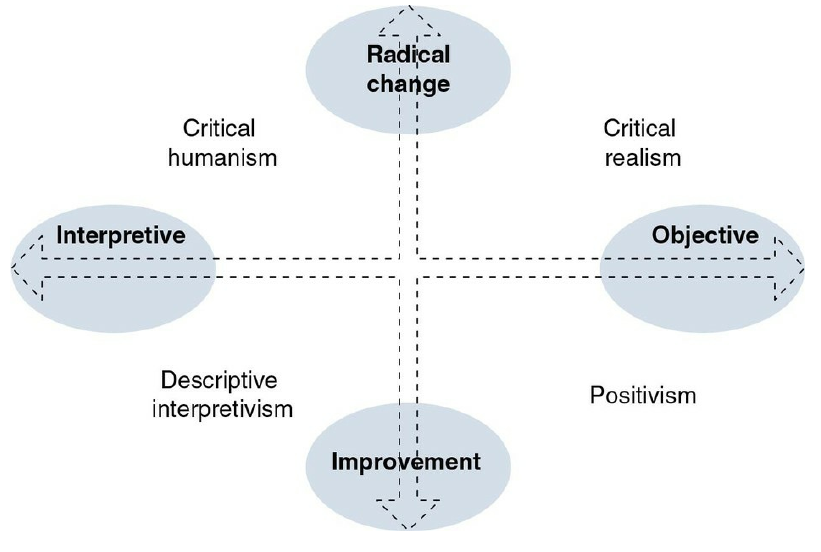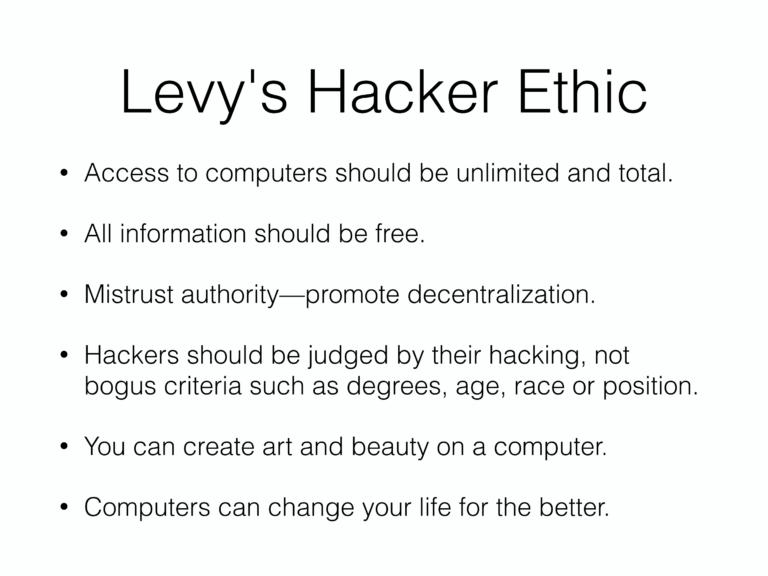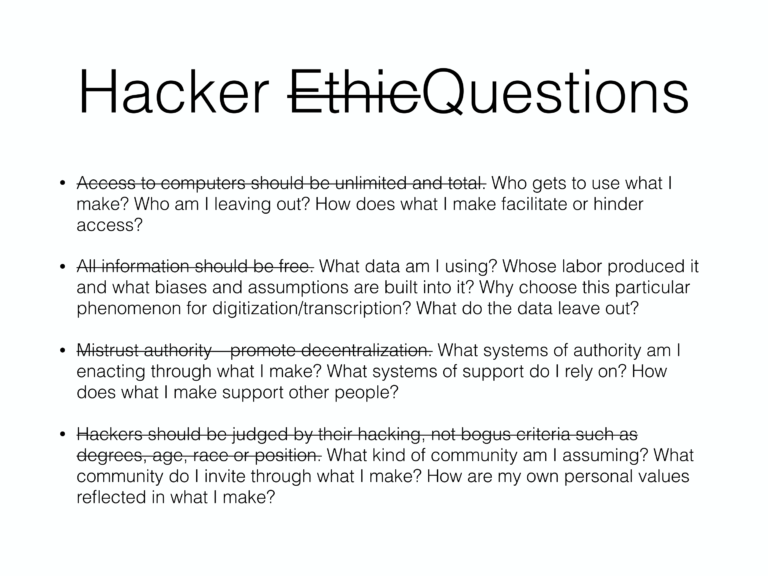Towards a new Hacker Ethic
Sun Feb 02 2020
Last week I listened to the talk Programming is Forgetting: Toward a New Hacker Ethic for a second time. This was an amazing talk given by Allison Parrish at the Open Hardware Summit in 2016. The first time I was introduced to this talk was over a year ago by a friend that was introducing me to the nuanced differences between “new” and “old” FOSS cultures. Whenever I listen to this talk I get nostalgic about 70’s and 80’s hacker literature like the “Hackers Manifesto” which inspired me in middle school.
Parrish’s talk examined the points that Levy makes in his influential book Hackers: Heroes of the Computer Revolution. This talk picked out how aspects of Levy’s hacker ethos are problematic and how we can work to change this Hacker Ethic to be more supportive of diverse communities.
However, before we dive into the breakdown of Levy’s and Parrish’s arguments, it is important to have a common understanding of these things:
- what being a hacker means
- our assumptions about learning, knowing and society
0.1 What “Hacker” Means
The mainstream definition of a “hacker” is a derogatory term to describe cyber-criminals; however, “hacker” in the tech world is a positive and respected term. In the tech world, “hacker” is used synonymously with geek: people who love to tinker with computers at great lengths. Due to the vast differences in the interpreted meaning of “hacker”, people have been avoiding using that term. For this article and in general when people typically talk about “hacker culture”, they are referring to the positive definition of hacker.
0.2 Assumptions on knowledge and society
Being the philosophy buff that I am, I believe that recognizing our assumptions about knowledge and society is quintessential to understanding Levy’s and Parrish’s views on the hacker ethic.

On the scale of knowledge, people fall somewhere on the scale between subjective and objective thinking. An objectivist seeks generalizations, favors statistical analysis, and views reality as separate from human experience. A subjectivist believes that reality is formed through personal experience and views knowledge as a working definition. When discussing discovery, an objectivist will try to find the Truth, where a subjectivist will seek to learn truths. In policy analysis, objectivists would favor quantitative methods where subjectivists would favor qualitative methods.
When examining socioty, people usually fall on a spectrum between radical change and improvement.
Status Quo (Improvement)
- social order
- consensus
- actuality
Radical Change
- power structures
- radical change
- modes of domination
- contradiction
- potentiality
Although people don’t always fall at perfect edges of this spectrum, it provides a good frame of reference when discussing policies. Levy’s hacker ethic falls in the positivism quadrant since he focused on incremental improvements twords “ideal” software. Parrish’s ethos falls in the Critical Humanism quadrant because she is focused on the multiple truths of software communities and is focuses on the power structure that software supports.
1 Levy’s Hacker Ethic

2 Parrish’s Hacker Ethic Rewrite

3 Why the difference?
Despite the rewrite, both hacker ethics still emphasize the importance of:
- sharing
- openness
- free access to computers
- world improvement
The major difference between the two ethics is not in the fundamental message but on the philosophical perspectives of the authors.
Levy’s hacker ethic was written and interpreted using the incrementalism framework. Computer hacking is the means of incrementally improving flawed technology moving towards the Truth– a computer system that perfectly works.
Parrish’s hacker ethic focuses on how can we use technology to better truths– computer systems designed with different purposes to better support communities.
4 Who is right?
As a subjectivist, I would argue that the debate over which one is the True or better hacker ethic is fruitless. Moving forward with this revised working definition of the Hacker Ethic will better enable us to better support diverse communities.
Positivism has long been the dominant perspective in politics and research. However, in recent years there has been a shift towards a mix of objective and subjective perspectives in research. This is due to the fact that when you look at the objective Truth or the average of a population you often ignore minorities. In public policy, an objective viewpoint is useful when doing cost-risk analysis; however, subjective research is useful when identifying complex social issues that are hard to quantify with numbers.
5 How did we get here in technology?
During the Future is Open Conference Mike Nolan gave an amazing analogy that explains how we got here and why we need to have this debate in FOSS and hacker culture. Nolan compared the beginning of computers to homesteading in the western frontier. In the beginning, there was plenty of land for everyone and everyone got their own chunk of land. Everyone was happy and they maintained their land or “software” independently of each other. There was seldom any issues. However, as time went on you couldn’t get your own plot of land. We now all live in large cities packed with communities, governments, and law swaying our every action. With all of these competing entities, it is impossible to work on instrumental software without interacting other entities.
The things that hackers make often originate as a personal project. We as hackers are content with perusing these projects towards our own objective Truth. Over time what started as a personal project may turn into a massive open-source project that dozens of communities depend on. This is the root of a ton of friction now in days: our objective Truth as the original developer may not align with the truths or needs of the community. To alleviate this “friction”, I believe that adopting Parrish’s subjective interpretation of the Hacker Ethic is a great way to start.
Recent Posts
The Data Spotify Collected On Me Over Ten YearsVisualizing Fitbit GPS Data
Running a Minecraft Server With Docker
DIY Video Hosting Server
Running Scala Code in Docker
Quadtree Animations with Matplotlib
2020 in Review
Segmenting Images With Quadtrees
Implementing a Quadtree in Python
Parallel Java Performance Overview